Encyclopaedia of Religion and Ethics (13 vols.)
Digital Logos Edition
Overview
One of James Hastings’ greatest and most complete compilations of religious and historical information, the Encyclopaedia of Religion and Ethics (13 vols.) covers a multitude of Christian topics, as well as philosophical and lifestyle principles from other world religions. Featuring a staggering amount of philosophical and religious background information, this encyclopedia took nearly twenty years to complete and features over 10,000 pages, which is the equivalent of an entire bookshelf!
Finding a need for a massive collection of this nature with the expansion of knowledge in the twentieth-century, Hastings created a comprehensive reference work. With over 100 expert contributors, these 13 volumes include topics such as anthropology, mythology, biology, and sociology, in addition to religious subjects such as sacrifice, devotion, faith, and confession. Considered an immediate authoritative work at its publication, Encyclopaedia of Religion and Ethics (13 vols.) is perfect for students, pastors, and anyone needing an overall introduction and summary of various religions and morals.
Hastings provides an invaluable contribution to scholarly reference works, as well as lending perspective into the scholarship of the time. Written in an engaging, readable, and authoritative style, this collection is an essential study aid and reference guide to a wide array of topics. There are also extensive bibliographies to help guide research. The Logos edition makes it easy to use side-by-side with your other reference works, perfect for home study, sermon preparation, and general information. In Logos, the cross-references are linked to other resources in your library. With the advanced search features of Logos, you can easily find the exact articles and topics you're looking for, in less time than searching the print edition.

- Over 10,000 pages of entries
- Summaries of philosophical and religious topics
- Includes prefaces, lists of contributors, and charts to guide research
Top Highlights
“It is only in its wider signification that archæology comes into contact with the study of religion or ethics. Ancient technology and ancient æsthetic, considered specially, occupy their own domain apart. But there are few, if any, religions which have not prompted the production of monuments, ornaments, utensils, and other ritual accessories; or affected the form and decoration of the instruments of daily life. And as these material expressions of religious ideas, once produced, are capable of preservation independently of their makers, they may be, and often are, the only evidence which has been preserved of the religion of an extinct people, whose beliefs and traditions have perished with it.” (Volume 1, Page 676)
“It is, then, in moral likeness to God that man’s perfection or holiness consists.” (Volume 6, Page 744)
“ It implies the constant activity and positive exercise of all goodness in the realm of daily life.” (Volume 6, Page 745)
“ It was the full presentation, in the first instance to God Himself, of the moral glory of the Father’s own holiness,” (Volume 6, Page 744)
“The NT is explicit in emphasizing the ethical nature of true holiness, its contrast to all licence and uncleanness” (Volume 6, Page 744)
- James Hastings
- Hartley Alexander
- James Baldwin
- Dr. William Bennett
- Rev. Herbert Edward Douglas Blakiston
- Gerard Baldwin Brown
- William Leslie Davidson
- Rev. Adrian Fortesque
- Romesh C. Dutt
- Rev. Arthur Ernest Crawley
- Rev. Adrian Fortescue
- Julius Jolly, Ph.D.
- James Hervey Hyslop
- David George Hogarth
- Duncan B. Macdonald
- Rev. Richard Waddy Moss
- Bertha Maud Horack Shambaugh
- William Matthew Flinders Petrie
- Sir Clements Markham
- Maurice De Wulf
- Rev. J. Macbride Sterrett
- Robert Mark Wenley
- Title: Encyclopaedia of Religion and Ethics (13 vols.)
- Editor: James Hastings
- Publisher: Encyclopaedia of Religion and Ethic
- Volumes: 13
- Pages: 10,949
This title is included in the following collections
You can save when you purchase this product as part of a collection.
Logos 9 Reformed Gold Legacy L...
$849.99$849.99Unfiltered (Logos Special Edit...
$999.99$999.99Logos 8 Reformed Platinum Lega...
$1,499.99$1,499.99Logos 9 Pentecostal & Charisma...
$1,499.99$1,499.99
- $1,499.99
- $3,499.99$2,799.99
- $2,999.99
- $2,999.99
- $2,999.99
- $2,999.99
- $2,999.99
- $4,749.99$3,562.49
- $4,749.99$3,562.49
- $4,899.99$3,674.99
- $4,749.99
- $4,749.99
- $4,749.99
- $4,749.99
- $4,749.99
- $4,749.99
- $12,102.39$7,299.99
- $11,399.99
- $11,399.99
- $23,999.99$17,999.99
- $21,749.99
- $24,999.99
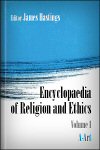
Volume 1: A—Art
- Editor: James Hastings
- Series: Encyclopaedia of Religion and Ethics
- Publisher: Charles Scribner’s Sons
- Publication Date: 1908
- Pages: 939
This first volume covers all subjects from the significance of the letter A to Art, including topics from adoration, the influence of Alexander the Great, and arbitrariness. Some topics are covered by more than one editor, providing valuable context.
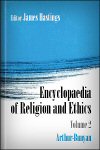
Volume 2: Arthur—Bunyan
- Editor: James Hastings
- Series: Encyclopaedia of Religion and Ethics
- Publisher: Charles Scribner’s Sons
- Publication Date: 1910
- Pages: 932
Hastings’s second volume includes entries on asceticism, athletics, beauty, the Bible, and how the human body has been regarded.
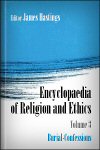
Volume 3: Burial—Confessions
- Editor: James Hastings
- Series: Encyclopaedia of Religion and Ethics
- Publisher: Charles Scribner’s Sons
- Publication Date: 1910
- Pages: 919
The third volume contains subjects such as Burma, charms and amulets, cherubs, and circumcision.
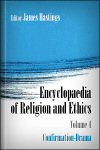
Volume 4: Confirmation—Drama
- Editor: James Hastings
- Series: Encyclopaedia of Religion and Ethics
- Publisher: Charles Scribner’s Sons
- Publication Date: 1910
- Pages: 931
Volume 4 covers topics such as congregation, conscience, the Coptic Church, councils and synods, death, and Descartes.
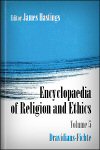
Volume 5: Dravidians—Fichte
- Editor: James Hastings
- Series: Encyclopaedia of Religion and Ethics
- Publisher: Charles Scribner’s Sons
- Publication Date: 1912
- Pages: 933
This volume covers a large section on dreams, drums, emancipation, epiphany, ethics, and festivals and feasts.
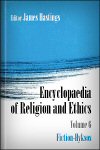
Volume 6: Fiction—Hyksos
- Editor: James Hastings
- Series: Encyclopaedia of Religion and Ethics
- Publisher: Charles Scribner’s Sons
- Publication Date: 1914
- Pages: 920
Hastings’s sixth volume covers topics such as fortune, gifts, holiness, Greek religion, and heredity.
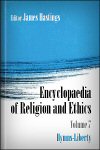
Volume 7: Hymns—Liberty
- Editor: James Hastings
- Series: Encyclopaedia of Religion and Ethics
- Publisher: Charles Scribner’s Sons
- Publication Date: 1915
- Pages: 864
This ninth volume covers subjects such as images and idols, initiation, justification, kinship, and laity.
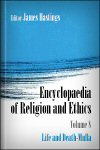
Volume 8: Life and Death—Mulla
- Editor: James Hastings
- Series: Encyclopaedia of Religion and Ethics
- Publisher: Charles Scribner’s Sons
- Publication Date: 1916
- Pages: 944
This eighth volume includes a section on differing views on life and death, light and darkness, including topics on the Mayans, miracles, and love.
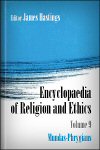
Volume 9: Mundas—Phrygians
- Editor: James Hastings
- Series: Encyclopaedia of Religion and Ethics
- Publisher: Charles Scribner’s Sons
- Publication Date: 1917
- Pages: 942
This ninth volume covers subjects such as music, the importance of names, parthenogenesis, philosophy, and personification.
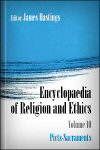
Volume 10: Picts—Sacraments
- Editor: James Hastings
- Series: Encyclopaedia of Religion and Ethics
- Publisher: Charles Scribner’s Sons
- Publication Date: 1919
- Pages: 944
Hastings’s tenth volume includes entries on righteousness, the priesthood, prayer, Purim, and rationalism.
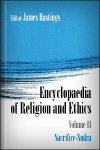
Volume 11: Sacrifice—Sudra
- Editor: James Hastings
- Series: Encyclopaedia of Religion and Ethics
- Publisher: Charles Scribner’s Sons
- Publication Date: 1919
- Pages: 916
The eleventh volume contains entries on scholarship, sermons, and seminary.
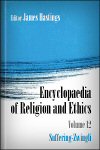
Volume 12: Suffering—Zwingli
- Author: Roland Boer
- Editor: James Hastings
- Series: Encyclopaedia of Religion and Ethics
- Publisher: Charles Scribner’s Sons
- Publication Date: 1922
- Pages: 910
Hastings compiles information from views on suffering to a summary of the Swiss Reformer Ulrich Zwingli. Other topics covered in this volume are utilitarianism, theosophy, the Talmud, as well an extensive section on how different religions have regarded the sun, moon, and stars.
Roland Boer is an associate professor in comparative literature and cultural studies at Monash University in Australia.
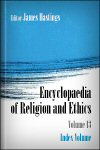
Volume 13: Index Volume
- Editor: James Hastings
- Series: Encyclopaedia of Religion and Ethics
- Publisher: Charles Scribner’s Sons
- Publication Date: 1926
- Pages: 775
The final volume is an index to the entire collection, featuring a general index, as well as for foreign words, scripture passages, and authors of the entries.
James Hastings was born in 1852 in Scotland. He was a Presbyterian minister and theologian. Hastings was the editor of many Biblical works, including: Dictionary of the Bible, Dictionary of Christ and the Gospels, Encyclopaedia of Religion and Ethics, and The Great Texts of the Bible. He died in 1922.
Reviews
27 ratings
DMM
4/2/2025
While obviously a bit dated, this is still very much an excellent encyclopedia. Do remember that this is not an encyclopedia of the Bible - you won't find, for example, an article on the book of Jeremiah in here. The scope of this work is much broader. One thing I appreciate about it is that you'll have articles that cover a topic from various points of view, each one written by someone who I would presume was an expert on it. For example, there are 50+ pages devoted to "Cosmogony and Cosmology", covering 18 different views, including North American, Babylonian, Buddhist, Celtic, Chinese, Christian, etc. Under "Demons and Spirits" you have 71 pages of content covering 19 different people groups/belief systems. Browsing through it, you'll find very interesting and perhaps unexpected things - there's an entire 16 paged entry on Lycanthropy and a smaller one on Vampires. There's an entry on Profanity (no, it doesn't give examples) and one on the Points of the Compass. You could easily get lost just browsing. The articles are well written and interesting.
Alessandro
12/5/2022
Stanislav Lanc
12/1/2022
The perfect encyclopedia! What is mentioned in the Overview above is real. The treatment of some specific entries (ethics, philosophy, etc.) is not in this range of other dictionaries. An excellent supplement to biblical and theological lexicons. This year's purchases (AYBD 6 vols. and ISBE 4 vols.) cost me a lot, but they are worth it! :-)
Billy Avery
4/21/2022
Wellington Aguiar
1/10/2021
Alvis
9/30/2020

SEONGJAE YEO
10/5/2019

SEONGJAE YEO
10/5/2019
J Wycherley-Horner
9/4/2018
I've only just discovered this encyclopaedic work so am unable to review it, but its content index puts me very much in mind of the 1980s IVP volume The New Dictionary of Christian Ethics and Pastoral Theology. If anyone is familiar with the latter, I'd be interested to know whether that's a valid impression. Thanks for reading this.
Kevin Bratcher
6/12/2018